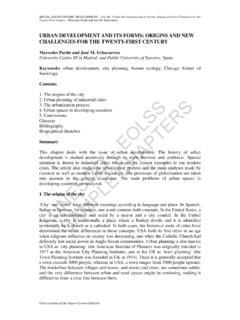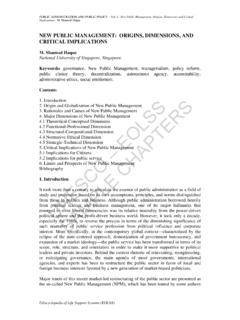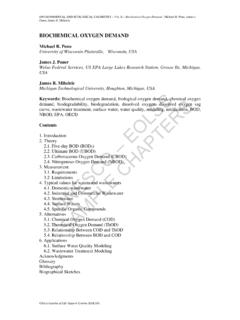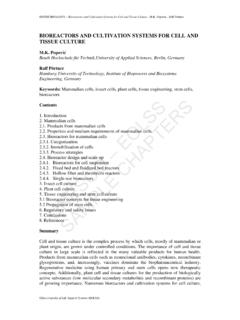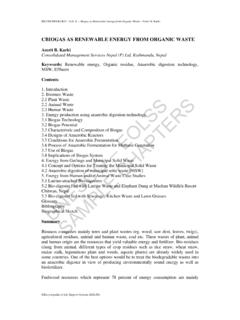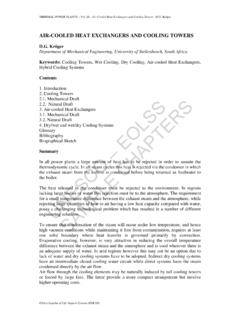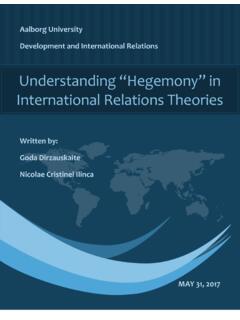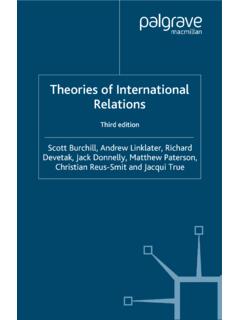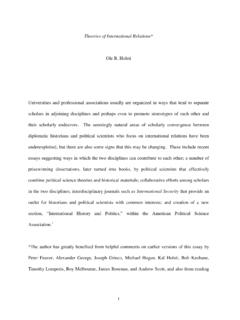Transcription of International Relations and Contemporary World Issues
1 UNESCO EOLSSSAMPLE CHAPTERSINTERNATIONAL Relations International Relations and Contemporary World Issues - Fulvio Attina Encyclopedia of Life Support Systems (EOLSS) International Relations AND Contemporary World Issues Fulvio Attina Department of Political Studies, University of Catania, Italy Keywords: globalization, fragmentation, International politics, non state actors, global problems, global political agenda, pluralist theories of International politics, International democracy, functionalism, individualization, NGOs, governance, democratic peace, cosmopolitan democracy Contents 1.
2 Globalization and International Politics 2. State and Non-State Actors in Global Politics 3. Sustainable Development and the Agenda of the Global System 4. International Relations Theory and the Problem of Sustainable Development Pluralist theories theories of International Democracy Glossary Bibliography Biographical Sketch Summary This chapter is about the relationship between globalization and International politics. The first section makes a presentation of the reciprocal influence that characterizes this relationship. The second section concentrates on the extension of the number and kinds of the International actors and on the appearance of non-state actors, like NGOs, in World politics.
3 This change, caused by the process of globalization, is extremely important in the definition of the global political system and the agenda of the sustainable development. The third section analyses the agenda of the global system and the institutions and procedures supplied by the state system to the global system in order to deliver political regulation to the global problems. The last section informs about the reaction of the International Relations theorists to the challenge posed to the knowledge of International politics by the globalization process. It reviews two great groups of theories : the pluralist school, which has been the most responsive school to the perception of the change of the International life, and the school of International democracy, which covers the analysis of a wide spectrum of problems and answers to important transformations which are affecting politics at the state and inter-state level.
4 A generic way of understanding globalization is to consider it as a process of creation of a worldwide system in which no event, process or important action remains circumscribed within the geographic area in which it was born. In the same way, events, processes and actions of the global level have an impact, either deliberately or involuntarily, on all the local levels. However, the predominant image of globalization is constructed on the basis of the second meaning namely, the impact of the global on the local - because we are instinctively led to assume that the subjects which are in a UNESCO EOLSSSAMPLE CHAPTERSINTERNATIONAL Relations International Relations and Contemporary World Issues - Fulvio Attina Encyclopedia of Life Support Systems (EOLSS) privileged position in the global system are by nature stronger than the local.
5 Therefore, the term globalization is considered the synonym of homogenization, uniformization and also westernization or Americanization. This image generates negative attitudes in relation to globalization because it becomes the synonym of the leveling of the social World . Against this vision, there is a more balanced vision according to which the global system and the local systems have their own origins and determinant factors and are the object of the same material and ideological factors that produce their existence and complementarities. The same material and ideological causes that accelerate the process of globalization produce the process of individualization because the single subject the individual (man/woman, microgroup, region, nation, state, culture, civilization) is enabled by material factors and legitimated by ideological factors to promote its own autonomy and self-organization.
6 Uniformity in the globalized World is confronted with a high number of opportunities to move and communicate. Individuals can use these opportunities to defend and promote their rights and identities. Uniformity is, therefore, accompanied by singularity, discontinuity, decentralization and other characteristics of the present World which are synthetically named as factors of fragmentation to emphasize the hostile reaction and barriers that individuals create against the uniformization. Inevitably the reaffirmation of individuality goes hand in hand with context and competition but also with emulation and the coming together of the individuals in the global system.
7 The material factors of globalization the technical advancements in transportation, communication and economy have evolved in leaps and bounds in human history. The last leaps and bounds have been the first, second, third and today the fourth industrial revolution, the electronic revolution. Since the French revolution, the ideological factors of the globalization process ( the spreading of human and people rights) have also evolved in leaps and bounds. These material and ideological factors have an effect in the World as a whole and also within the single country.
8 They have generated the expansion of a World -wide economic market. They have created the same demands to face the same problems (environmental, social, etc.) with political decisions. This chapter is about the Relations between the globalization process and International politics. Our interest concentrates on the analysis of the adaptation of the organization of the International system to globalization and the analysis of the institutional procedures supplied by the state system to the global system in order to provide political regulations of the global problems.
9 1. Globalization and International Politics The long process of globalization has been strictly associated with processes taking place in the International political system. Clark (1997: 24-26) highlighted five explanations of the dependence of globalization upon International politics. The first explanation interprets globalization as an expansion of Europe and its most powerful states. The political unification of the World is the product of the exportation of the rules and institutions of the European states system to the whole planet. Bull and Watson (1984) have produced a wide-ranging presentation of this process of expansion of the European International society to the rest of the World and of the transformations undergone by the Asian, American and African systems in their adaptation to European expansion.
10 Others - like Jones (1981) have examined the reasons behind the UNESCO EOLSSSAMPLE CHAPTERSINTERNATIONAL Relations International Relations and Contemporary World Issues - Fulvio Attina Encyclopedia of Life Support Systems (EOLSS) European miracle , the reasons why Europe has the upper hand over the other parts of the World when Europe and the other parts of the World have entered more intensively into Relations among themselves, at the beginning of the modern age. The second school relates the globalization process to the fluctuation of International power.


